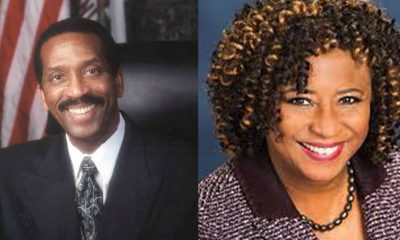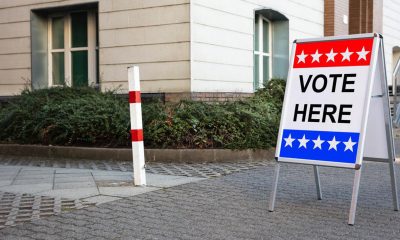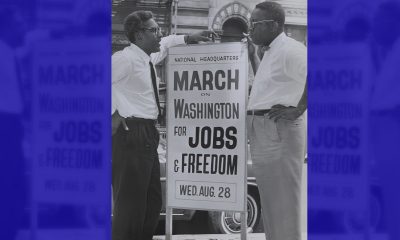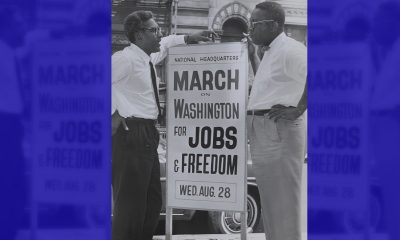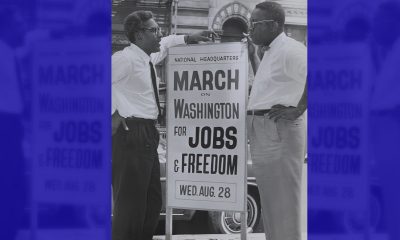Politics
Black Lives Matter Vote Could Swing Some Key Elections
By Charles D. Ellison
Special to the NNPA from The Philadelphia Tribune
(NNPA)—There are now five presidential battleground states in 2016 that could be heavily impacted by the #BlackLivesMatter movement.
Of course, it depends on a variety of factors and where the political winds blow. And many observers are in wait-and-see mode over the exact status of a scattered, yet burgeoning “Second Civil Rights Movement” some experts perceive as lacking needed political teeth.
That status, also put on slight hiatus by a much more frigid than normal winter, just got complicated with last week’s shootings of two Ferguson, Mo., police officers during an otherwise peaceful protest marking the resignation of police chief Thomas Jackson.
Yet, despite the challenges, there are signs the movement could dramatically shake up the political landscape in several key states. Location, it seems, is everything. The five battleground states identified are also the same spots where tragic shootings of unarmed Black men have taken place in recent years: Florida, Missouri, Ohio, Pennsylvania and Wisconsin.
Three of these states are already launching pads for three prospective Republican presidential candidates.
All five states are also places where Democratic presidential primaries, statewide gubernatorial and senatorial races and general elections find campaigns occasionally declaring all-out electoral war when wooing Black voters.
With the tragedies in each of these states sparking massive social justice protests — from the genesis of #BlackLivesMatter in Ferguson to the spawning of Young, Black and Gifted in Madison, Wis. — there is evidence the movements could mobilize Black voters into action for 2016. That comes at a time when many activists and voter advocates are concerned African-American turnout will be substantially depressed in the next presidential election without President Barack Obama’s name on the ballot. Many Democratic strategists worry Black turnout will be a major challenge without the kind of candidate that will excite them into action in the next election cycle.
However, issues such as police brutality and violence could.
“Given the intensity of the issue and that it’s not likely to be resolved any time soon, I think the momentum will last until the next election,” DePaul University political scientist Christina Rivers told the Tribune. “In particular, I think the #BlackLivesMatter movement will galvanize young Black voters, especially students.”
Rivers also points to students and young voters in North Carolina fighting against that state’s voter suppression laws. And last week, students from HBCUs Fisk and Tennessee State University filed a federal lawsuit challenging Tennessee’s voter ID law.
In Florida, the African-American community is still uneasy and upset over the needless so-called “Stand Your Ground” defense slayings of Black teens Trayvon Martin and Jordan Davis, in which the former’s killer, a troubled George Zimmerman, was acquitted. But, the Sunshine State is also a well-known political bellwether greatly influencing presidential primaries and the general election cycle. It just recovered from a caustic gubernatorial election in which the state’s controversial Republican Gov. Rick Scott won a second term and one of its U.S. senators, Republican Marco Rubio, is openly mulling a 2016 presidential bid. The state is also 20 percent African American.
In Missouri, Black protesters are still smarting over the killing of Black teen Michael Brown and the non-indictment of Ferguson police officer Darren Wilson. Upcoming city council protests in April could be a preview of what the Black electorate, 13 percent of Missouri’s population, could do in 2016.
While protests simmered to a near stop over the winter, advocates have kick-started activities in the wake of federal Department of Justice probe findings of racist policing patterns by the department, the announcement of no civil rights charges against Wilson and the exit of the police chief and city manager.
Ohio is also home to two extremely tragic cases: the case of 12-year old Tamir Rice in Cleveland and John Crawford in Beavercreek. In both instances, white police officers wrongly assumed Black males were armed and dangerous when they were not, killing both within seconds of seeing them and without stopping to assess either situation.
Out of all five states identified, Wisconsin could be the ugliest. A perfect firestorm of political factors are converging on that state, still shaking off the hangover of a nasty recall election triggered by labor unions against Badger State Gov. Scott Walker (R-Wis.). Walker won, but the wounds are visible as Walker continues pressing forward with state right-to-work laws perceived as an existential threat to the state’s public sector workforce.
Making the situation even more politically caustic is the recent fatal shooting of unarmed Black teen Tony Robinson in the state capitol, Madison, Wis., by a white city police officer.
While Madison is considered an oasis of Badger State liberal politics, and the state’s second-largest city with a Black population near 10 percent, it’s now become the flashpoint of brewing protests over Robinson’s death.
But, Walker is also currently viewed as a growing favorite and front-runner in the 2016 presidential race. While the governor, predictably, has not made any comment on what’s happened in Madison, an emerging alliance between Black protesters and state labor unions desperately seeking an ally in their fight against right-to-work could become a thorn in Walker’s national ambitions.
It may not be as impactful in the GOP primary (since the Black vote is less than 10 percent of the Republican electorate). But any sudden spike in Black political activity in Wisconsin could prove challenging for Republicans, especially if Walker wins the primary as a presidential nominee or, at the very least, becomes the nominee’s running mate.
Still, some are doubtful the growing youth movement will gain the traction it needs by 2016 or be politically savvy enough to know what it must do.
“We’ll see how much actual policy comes out of state legislatures and city councils in those states,” said former Colorado Senate President Peter Groff, now a prominent national advisor to Black state legislators. “Recommendations are sitting there, but I haven’t seen much policy movement.”
“From a media standpoint, the ‘movement’ is losing steam,” added Groff.
Washington, D.C.-based attorney and former District of Columbia Democratic Party Committee Chair A. Scott Bolden is also skeptical.
“I would be leery of the notion that these incidents will resonate beyond the protesters,” Bolden argued, suggesting movement platforms could inadvertently alienate white voters. “People who don’t look like you and me have a much different and much more positive view of police.”
“Historically, these types of [police brutality] movements or protests haven’t translated into political impact,” added Bolden. “This angst against police has always been present. The difference, obviously, is social media since we now have immediate access to the events.”
###
Barbara Lee
Congresswoman Barbara Lee Issues Statement on Deaths of Humanitarian Aid Volunteers in Gaza
On April 2, a day after an Israeli airstrike erroneously killed seven employees of World Central Kitchen (WCK), a humanitarian organization delivering aid in the Gaza Strip, a statement was release by Rep. Barbara Lee (D-CA-12). “This is a devastating and avoidable tragedy. My prayers go to the families and loved ones of the selfless members of the World Central Kitchen team whose lives were lost,” said Lee.

By California Black Media
On April 2, a day after an Israeli airstrike erroneously killed seven employees of World Central Kitchen (WCK), a humanitarian organization delivering aid in the Gaza Strip, a statement was release by Rep. Barbara Lee (D-CA-12).
“This is a devastating and avoidable tragedy. My prayers go to the families and loved ones of the selfless members of the World Central Kitchen team whose lives were lost,” said Lee.
The same day, it was confirmed by the organization that the humanitarian aid volunteers were killed in a strike carried out by Israel Defense Forces (IDF). Prior to the incident, members of the team had been travelling in two armored vehicles marked with the WCF logo and they had been coordinating their movements with the IDF. The group had successfully delivered 10 tons of humanitarian food in a deconflicted zone when its convoy was struck.
“This is not only an attack against WCK. This is an attack on humanitarian organizations showing up in the direst situations where food is being used as a weapon of war. This is unforgivable,” said Erin Gore, chief executive officer of World Central Kitchen.
The seven victims included a U.S. citizen as well as others from Australia, Poland, the United Kingdom, Canada, and Palestine.
Lee has been a vocal advocate for a ceasefire in Gaza and has supported actions by President Joe Biden to airdrop humanitarian aid in the area.
“Far too many civilians have lost their lives as a result of Benjamin Netanyahu’s reprehensible military offensive. The U.S. must join with our allies and demand an immediate, permanent ceasefire – it’s long overdue,” Lee said.
Community
Financial Assistance Bill for Descendants of Enslaved Persons to Help Them Purchase, Own, or Maintain a Home
California Legislative Black Caucus (CLBC) vice chair Sen. Steven Bradford (D-Inglewood) introduced new legislation related to reparations to the Senate Committee on Housing on April 2 in Sacramento. Senate Bill (SB) 1007, “establishes the Homeowner’s Assistance for Descendants of Enslaved Persons Program to make financial aid or assistance available to descendants for the purposes of purchasing, owning, or maintaining a home,” the legislation states.
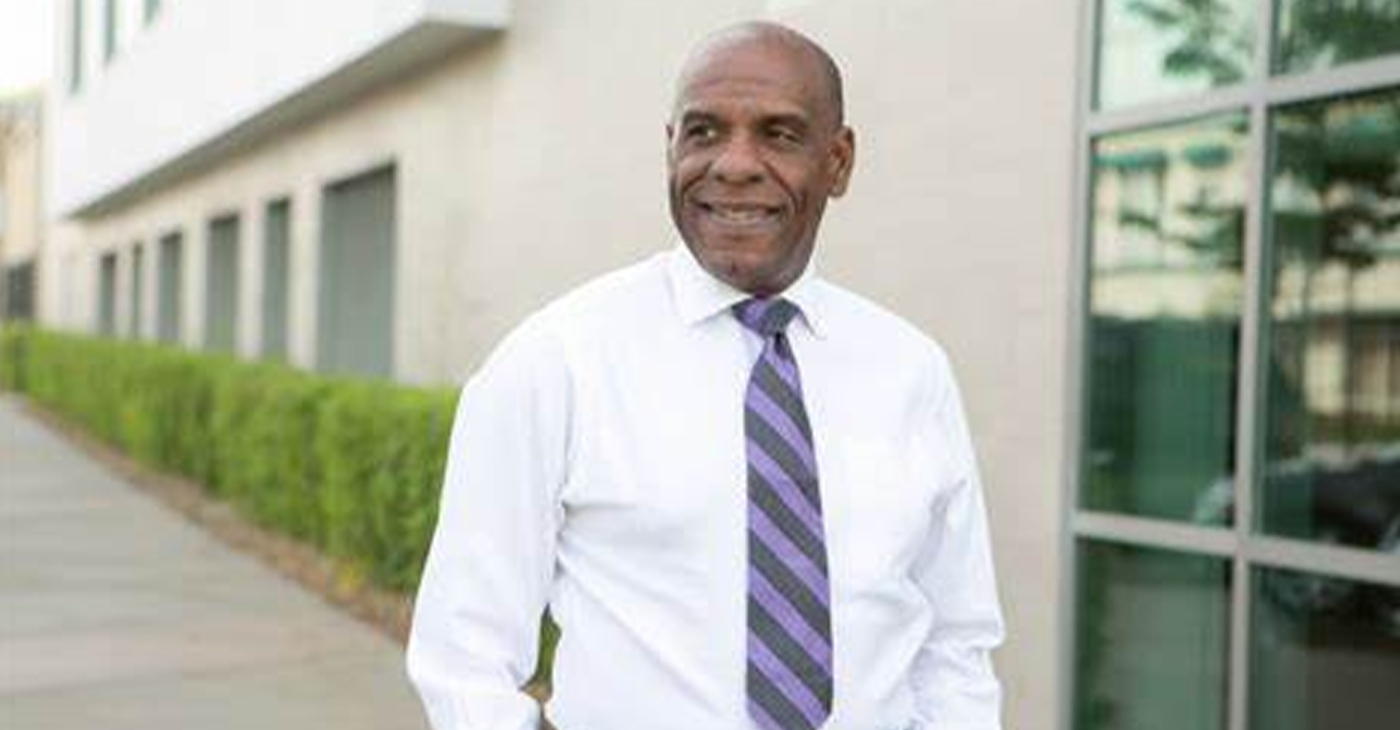
California Legislative Black Caucus (CLBC) vice chair Sen. Steven Bradford (D-Inglewood) introduced new legislation related to reparations to the Senate Committee on Housing on April 2 in Sacramento.
Senate Bill (SB) 1007, “establishes the Homeowner’s Assistance for Descendants of Enslaved Persons Program to make financial aid or assistance available to descendants for the purposes of purchasing, owning, or maintaining a home,” the legislation states.
The Senate Housing Committee advanced the bill with an 8-1 vote. It will be re-referred to the Appropriations Committee for consideration.
Sen. Kelly Seyarto (R-Murrieta) was the only member who voted against the bill.
“SB 1007 is about starting a long process of paying back a debt that is not only owed, but that was also promised, and is 160 years overdue, to African Americans,” Bradford told the committee chaired by Sen. Nancy Skinner (D-Berkeley). “It is the first step in closing the wealth and equity gap created by centuries of slavery and racial discrimination policies.”
The bill aligns with one of the 115 recommendations listed in a two-year study conducted by the California reparations task force, of which Bradford was one of nine members.
Bradford said the report reveals that, in the state of California, a typical Black-owned home is 22% less valuable than a White-owned home.
Various advocacy groups from around the state attended the hearing held at the State Capitol Annex Swing Space. The California Housing Partnership, Bay Area Regional Health and Inequities Initiative, Coalition for A Just and Equitable California, Disability Rights of California, the American Civil Liberties Union of California, and California Community Builders all voiced their support of the bill.
Community
AG Bonta Says Oakland School Leaders Should Comply with State Laws to Avoid ‘Disparate Harm’ When Closing or Merging Schools
California Attorney General Rob Bonta sent a letter this week to the Oakland Unified School District (OUSD) Board of Education saying the district has a duty to comply with state education and civil rights laws to protect students and families from “disparate harm,” such as segregation and discrimination, if the district goes ahead with school closures, mergers or consolidations in 2025-2026.
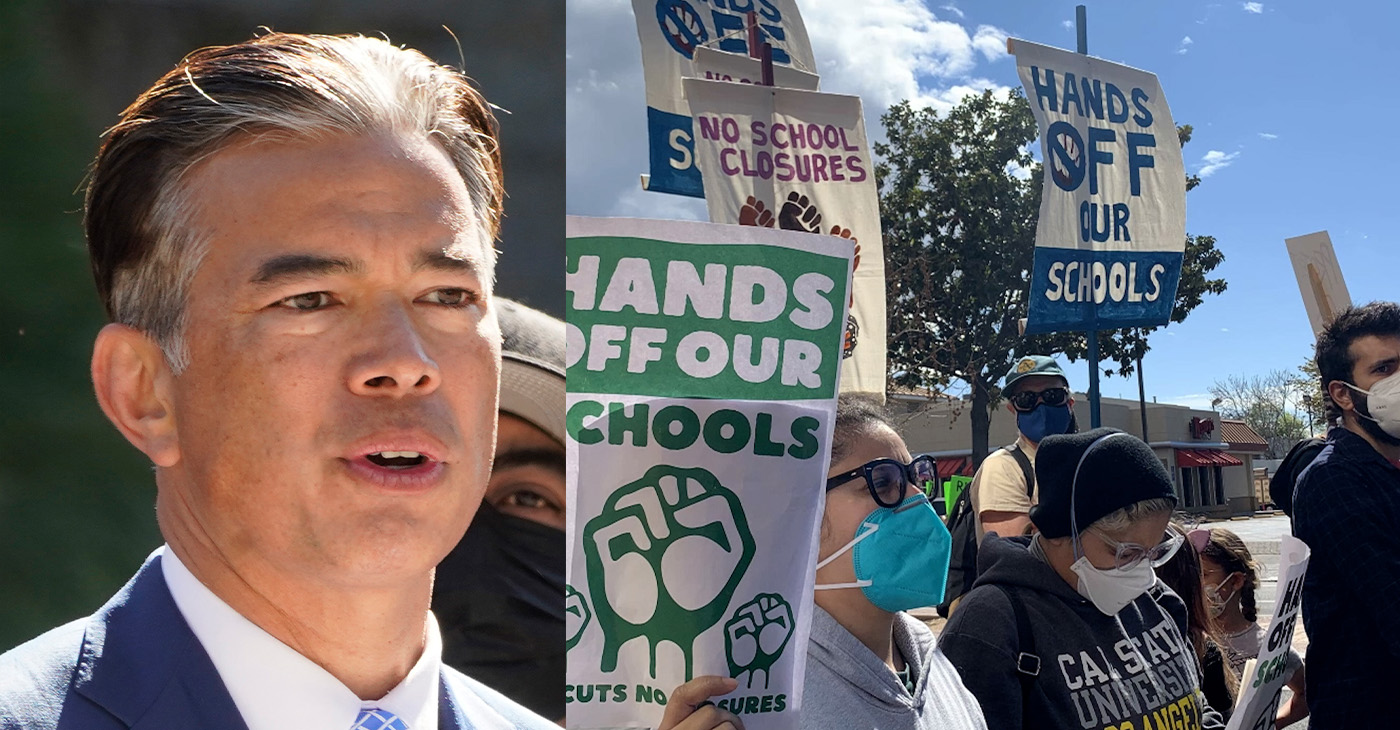
AG Bonta said DOJ investigation of 2022 closure decisions would have negatively impacted Black and low-income families.
By Post Staff
California Attorney General Rob Bonta sent a letter this week to the Oakland Unified School District (OUSD) Board of Education saying the district has a duty to comply with state education and civil rights laws to protect students and families from “disparate harm,” such as segregation and discrimination, if the district goes ahead with school closures, mergers or consolidations in 2025-2026.
The letter and an accompanying media release announced the findings of the California Department of Justice’s (DOJ) investigation into the OUSD Board’s Feb. 8, 2022, decision to close Parker Elementary, Brookfield Elementary, Carl B. Munck Elementary, Fred T. Korematsu Discovery Academy, Grass Valley Elementary, Horace Mann Elementary, and Community Day School and eliminate grades 6-8 of Hillcrest Elementary and La Escuelita Elementary.
“All school districts and their leadership have a legal obligation to protect vulnerable children and their communities from disparate harm when making school closure decisions,” said Attorney General Bonta.
“The bottom line is that discrimination in any form will not be tolerated,” he said. “I am committed to working with OUSD’s leadership to achieve successful outcomes for students.
“My office will continue to monitor OUSD’s processes and decision-making as it moves forward with the required community engagement, equity impact analysis, and planning to implement any future closures, mergers, or consolidations” to ensure compliance with California’s Constitution, AB 1912, and anti-discrimination laws.
By press time, the school district did not respond to a request for comment from OUSD.
The DOJ’s findings showed that the February 2022 decision, later partially rescinded, would have disproportionately impacted Black and low-income elementary students, as well as high-need students with disabilities, according to the media release.
The Attorney General outlined concerns about criteria OUSD has announced that it may rely on to determine future closures, mergers, and consolidations and provided recommendations to ensure OUSD does not violate state law, including prohibitions against closure decisions that reinforce school segregation or disproportionately impact any student group as required by the State Constitution, AB 1912, and anti-discrimination laws.
According to AB 1912, passed in September 2022, financially distressed school districts contemplating school closures, mergers, or consolidations must engage the community before closing schools; conduct an equity impact assessment; and provide the public with the set of criteria the district plans to utilize to make decisions.
In the letter, DOJ identified a “problematic” approach to planning for closing schools in 2025-2026 and “strongly recommends” steps OUSD should take going forward.
- “Take affirmative steps to ensure that its enrollment and attendance boundary and school closure decisions alleviate school segregation and do not create disproportionate transportation burdens for protected subgroups.”
- Don’t solely utilize criteria such as school facilities’ conditions, school operating costs, and school capacity without also including an assessment of past and present inequities in resources “due to educational segregation or other causes.”
- Some of OUSD’s proposed guidelines “may improperly penalize schools serving students with disabilities and students who have high needs.”
- The district’s decisions should also include “environmental factors, student demographics and feeder attendance patterns, transportation needs, and special programs.”
- Avoid overreliance on test scores and other quantitative data without also looking at “how each school is serving the needs of its specific student body, especially as it relates to historically marginalized communities.”
- “Engage an independent expert to facilitate community input and equity impact.”
The letter also emphasized that DOJ is willing to provide “feedback and consultation at any time during the process to ensure that OUSD’s process and outcomes are legally compliant and serve the best interests of the school community and all of its students.”
-

 Activism4 weeks ago
Activism4 weeks agoOakland Post: Week of March 20 – 26, 2024
-

 #NNPA BlackPress3 weeks ago
#NNPA BlackPress3 weeks agoCOMMENTARY: D.C. Crime Bill Fails to Address Root Causes of Violence and Incarceration
-

 #NNPA BlackPress3 weeks ago
#NNPA BlackPress3 weeks agoMayor, City Council President React to May 31 Closing of Birmingham-Southern College
-

 #NNPA BlackPress3 weeks ago
#NNPA BlackPress3 weeks agoFrom Raids to Revelations: The Dark Turn in Sean ‘Diddy’ Combs’ Saga
-

 #NNPA BlackPress3 weeks ago
#NNPA BlackPress3 weeks agoCOMMENTARY: Lady Day and The Lights!
-

 #NNPA BlackPress3 weeks ago
#NNPA BlackPress3 weeks agoBaltimore Key Bridge Catastrophe: A City’s Heartbreak and a Nation’s Alarm
-

 #NNPA BlackPress3 weeks ago
#NNPA BlackPress3 weeks agoBaltimore’s Key Bridge Struck by Ship, Collapses into Water
-

 Activism3 weeks ago
Activism3 weeks agoOakland Post: Week of March 27 – April 2, 2024


